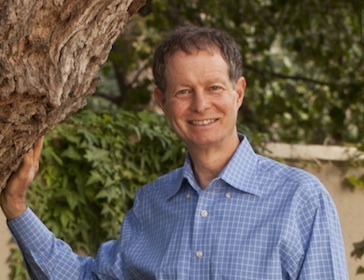Three years ago, TCN Journal reported that Whole Foods Market, the big, Austin-based organic- and natural-foods chain, was a leader in cutting greenhouse emissions at the same time its co-founder and co-CEO John Mackey was voicing skepticism about the widely held mainstream scientific conclusion that human beings are harmfully changing the climate with greenhouse gases.
“Whole Foods chief: Climate-change skeptic” was the headline on our 2010 article. That appraisal was based on a quoted passage in an interview with the New Yorker, in which the magazine reported that Mackey said “‘no scientific consensus exists’ regarding the causes of climate change.”
Well, the libertarian-leaning Mackey is currently promoting his new book, “Conscious Capitalism,” and in an email interview with Mother Jones that was posted on the liberal magazine’s website last week, he denied being a “climate-change skeptic.”
Here’s the relevant passage, with MJ designating Mother Jones reporter Josh Harkinson and JM standing for John Mackey:
MJ: You are known to be a bit of a climate-change skeptic. In your book you write that “some scientists estimate that the United States now absorbs as much carbon emissions as it emits.” Your source is a paper by the American Enterprise Institute, which has received funding from the Koch brothers and ExxonMobil. Do you really consider AEI a credible source?
JM: I believe that it is very important to read a variety of viewpoints, including those outside of our own ideological biases. Regarding carbon sequestration, you might want to look at the research by Fan and Gloor (Science, vol. 282: pp. 442-446 [subscription required]). This study indicated that the forested region in North America between 15 and 51 degrees north latitude was calculated to have a carbon sink that can annually remove CO2 from the air equal to all the carbon produced from fossil fuel consumption in both the United States and Canada.
Contrary to what has been written about me, I am not a “climate change skeptic.” Climate change is clearly occurring, and based on what I have read global temperatures have increased about 1.5 degrees Celsius over the past 150 years. We’ve been in a gradual warming trend since the ending of the “Little Ice Age” in about 1870, and climate change is perfectly natural and not necessarily bad. In general, most of humanity tends to flourish more when global temperatures are in a warming trend and I believe we will be able to successfully adapt to gradually rising temperatures. What I am opposed to is trying to stop virtually all economic progress because of the fear of climate change. I would hate to see billions of people condemned to remain in poverty because of climate change fears.
If by “perfectly natural” Mackey meant that he thinks current climate change is exclusively or mainly a result of natural phenomena, and not human influence, then that view is at odds with the great majority of scientists who study the subject.
For instance, the draft of a major, federally commissioned document that was issued earlier this month – the third congressionally requested Climate Assessment Report, this one compiled by more than 240 scientists – includes this statement:
Global climate is changing, and this is apparent across the U.S. in a wide range of observations. The climate change of the past 50 years is due primarily to human activities, predominantly the burning of fossil fuels.
U.S. average temperature has increased by about 1.5 degrees [Fahrenheit] since 1895, with more than 80 percent of this increase occurring since 1980. The most recent decade was the nation’s warmest on record. Because human-induced warming is superimposed on a naturally varying climate, rising temperatures are not evenly distributed across the country or over time.
As to the current and future harmfulness of the impacts – which Mackey said he believes humanity can “successfully adapt to” – the draft Climate Assessment Report said this:
Climate change threatens human health and well-being in many ways, including impacts from increased extreme weather events, wildfire, decreased air quality, diseases transmitted by insects, food, and water, and threats to mental health.
Climate change is increasing the risks of heat stress, respiratory stress from poor air quality, and the spread of waterborne diseases. Food security is emerging as an issue of concern, both within the U.S. and across the globe, and is affected by climate change. Large-scale changes in the environment due to climate change and extreme weather events are also increasing the risk of the emergence or reemergence of unfamiliar health threats.
Describing his political views generally, Mackey told Mother Jones:
I reject the premise that liberal and libertarian values are necessarily in conflict. In fact, I often self-identify as a ‘classical liberal.’ I am pro-choice, favor legalizing gay marriages, protecting our environment, enforcing strict animal welfare protection laws (I’ve been an ethical vegan for 10 years), marijuana legalization, having a welfare safety net for our poorest or disabled citizens, and a radically reduced defense budget and military presence around the world. However, I’m also a conscious capitalist—I believe economic freedom and entrepreneurship are the best ways to end poverty, increase prosperity, and evolve humanity upward.
In an interview that the New York Times published Sunday, Jan. 20, Mackey said he voted for Republican presidential nominee Mitt Romney last year.
He explained that he is “a capitalist, first. There are many things I don’t like about Romney, but more things I don’t like about [President Barack] Obama. This is America, and people disagree on things.”
– Bill Dawson
Image credit: Whole Foods Market®

